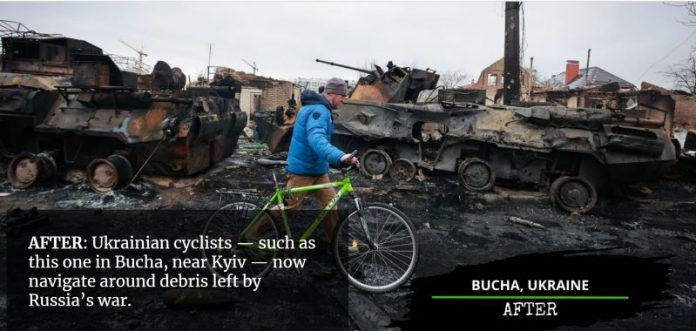‘More Than A Million Russians Have Left The Country’
In an interview with India Today, Secretary of State Antony Blinken dismisses Hindenburg and George Soros episodes as private matters concerning private companies.
WASHINGTON, Mar 4 (The CONNECT) – The war with Ukraine has cost Russia too dearly with the aggressor suffering 200,000 casualties, killed and wounded, US Secretary of State Antony J Blinken has said.
In an interview with Geeta Mohan of India Today, the text of which was released by the US government, Blinken said President Putin has inflicted terrible damage not only on Ukraine but on his own country. Public accounts say that Russia has suffered 200,000 casualties, killed and wounded, in Ukraine, and he keeps throwing bodies into this war, a war of his own making. More than a million Russians have left the country.
Unfortunately, tragically, Russia is persisting, he said and admitted: “It’s true it hasn’t stopped. But as it’s doing that, it is suffering tremendously”.
With a lot of support from countries around the world, the Ukraine people, he said have actually stopped what Russia was trying to do. “Russia was trying to erase Ukraine from the map, to absorb it into Russia, to make it so that it didn’t exist anymore. That has failed, and it’s failed because the Ukrainian people stood up and because so much of the world came to help Ukraine in defending itself,” Blinken explained.
Since then, since that initial attempt to eliminate Ukraine as an independent country failed, Russia has been pushed back in Ukraine to the east and to the south. The Ukrainians have taken back more than 50 percent of the territory that Russia seized from it early on in the aggression, he said.
Geeta Mohan began the interview by saying that the G20 presidency has begun at a tumultuous time. There are so many differences. “You’ve been speaking about it. We’ve heard various leaders in various press – at various press conferences address the same issue. But the bigger question over here is that despite all the conversations and heated exchanges that we’ve been hearing about, there still is no consensus on the Russia-Ukraine war, no consensus on the communique.
“She then asked: Now, in that, I’d like to know how and why has the West failed in isolating Russia. Why do I say that? Because Russia is still in the room, and in fact, you actually met the Russian foreign minister, Lavrov.
Blinken responded: So first, I think it’s very clear in a variety of ways that Russia is isolated in terms of its aggression against Ukraine. Go back a couple weeks ago – 141 countries, three quarters of the United Nations, stood up in the General Assembly and voted for a resolution condemning Russia’s aggression and calling for a just and durable peace in Ukraine. Here at the G20, the foreign ministers’ meeting, if you look at the chair statement that was put out by India, it reflects on the part of 18 of the 20 countries – that is, every country except for Russia and China – the very language that was used by the leaders in the Bali meetings just a few months ago in terms of what Russia is doing in Ukraine.
Blinken argued that a thousand companies from around the world have left Russia. They are not doing business there because the reputational cost of doing business has gotten to be too great.
Asked about the Hindenburg and George Soros episodes impacting Indian industrialists such as Gautam Adani, the Secretary of State said these are private matters concerning private companies, private citizens, and they don’t affect the relationship between the United States and India – the government to government and the work we’re doing both directly bilaterally, but also here at the G20 in support of India’s leadership.
On the global concerns over human rights in India, he said “we have an ongoing dialogue on both of our democracies and human rights, because, as the world’s two largest democracies, it’s central to who we are. It’s central to our identity”. “And in our own case, we’ve – from day one of our own democracy, our founding fathers set as an objective to try to form a more perfect union, which is an acknowledgment that we’re not perfect, we never will be, but it’s in trying to do ever better on democracy, on human rights, that we make progress. And I think that’s a shared commitment that both of us have. And when questions or issues come up, we discuss them directly, very openly, very freely. And I think we would hold each other to account when there are concerns,” he narrated.




